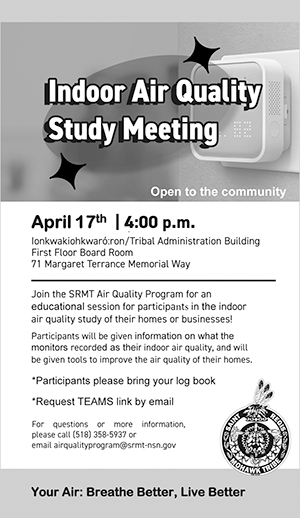Re-introducing Grand Chief Michael Kanentakeron Mitchell
After taking a long break from politics, Michael Kanentakeron Mitchell has found himself right at the forefront of Akwesasne politics once again as he was elected Grand Chief of the Mohawk Council of Akwesasne last June. With new issues on the table, the Grand Chief has had to adjust to MCA life again but he brings a wealth of experience with him to his position. Indian Time sat down with the Grand Chief to learn more about his past and outlook on present day issues.
Pre-Politics
After high school Mitchell jumped into ironwork but soon decided he wanted to go back to school and he found himself working for the National Film Board in Canada, where he worked on the production of several successful documentaries.
In the early 1970s Ernie Benedict had started up the North American Indian Traveling College (now known as the Ronathahonni Cultural Centre). Benedict encouraged Mitchell to come back home and put his skills and experience to use.
Mitchell said he wasn’t immediately impressed with the van full of old faded books that he was shown but Benedict told him to “Look at the opportunity and what you can make of it. Look at the future and what you can rebuild.”
Mitchell agreed to take on the project and so began the “second life of the traveling college.”
Land on Kawehno:ke (Cornwall Island) was offered to the college and as there were some remnants of a Native settlement the vision of the college was to build a replica of what a Mohawk village would have looked like. A log cabin museum and administration building were soon built with very little resources “but stirred up great excitement” and from there ideas began turning into projects and soon the traveling college was putting out material and videos that helped to spread Native culture awareness. By the late 70s there were more than 30 employees and the college quickly became well known and respected.

“Then everything after that was an adventure,” Mitchell said. “It became much talked about at other tribes and the opportunity there lasted for me for ten years.”
In 1980 a dispute at Camp Thompson stirred up controversy and the traveling college became a Red Cross location to help those involved with the dispute. Mitchell was determined to keep the college out of politics, but soon he was nominated for a position on Mohawk Council.
Introduction to Politics
In 1982 Mitchell was elected District Chief of Kawehno:ke.
“I quickly learned in that time how politics works,” he said. “I realized that much authority here still rested with Indian Affairs. They virtually controlled every service.”

In 1984 Mitchell was elected Grand Chief and he learned that MCA had a $3 million deficit with Indian Affairs that “no one knew about.”
“A whole new Council and a whole new dream was my introduction to politics,” Mitchell said. “I knew we had to break from the clutches of Indian Affairs and within six months I said we have to opt out of the Indian Act. We went door to door and the community voted to establish an election code.”
In 1986 MCA held its first election under the newly agreed upon election code. Mitchell met with the Minister of Indian Affairs and they resolved that the deficit was a result of bureaucratic mishandling and the two men made a 2-year pact that the Indian Affairs staff would be withdrawn and people in Akwesasne would take over their positions within MCA.

“We looked at the separation of administration and politics, and in five years we had eliminated the deficit and with a majority Native staff, we grew,” Mitchell said. “By then we had a grand chief and district chiefs and instead of a 2-year term we had 3-year terms Three years was more realistic to do proper planning, to have a vision and forecast what would be needed in the community.”
In his early years with MCA, Mitchell’s grandmother lived in an old age home up the hill in Kana:takon.

“She ordered me to come meet with the elders and they told me a lot of the difficulties they had,” he said. “I was very sensitive to the needs of elders so I regularly sat down with them and said ‘What do you see being needed in the community?‘ The list became orders for Council and within five years there were plans for Iakhihsohtha in Tsi Snaihne, the health facility in Kana:takon and Tsiionkwanonsoh:te on Kawehno:ke.”
Other dreams and plans included new schools and a new arena.
Political Mindset
Soon after becoming Grand Chief, Mitchell addressed the issue of what terminology had been applied to Akwesasne in being called the “Mohawk Band of Akwesasne.”
“The language and the mentality changed after my first term because the government has a subtle way to oppress Native people in Canada,” Mitchell said. “You always had a low opinion of yourself and it started with how we were classified.”

Mitchell wanted MCA to be referred to as a “nation” or “Council “and the word “reservation” was replaced with “territory.” It was then that MCA became known as MCA - the Mohawk Council of Akwesasne.
“It became a very popular game,” he said. “I put a cup in the middle of the (Council) table and when someone would say “band” or “reservation” they had to put 25 cents in.”
“Pretty soon it was a cultural awareness thing,” Mitchell said. “It was the whole idea that the Canadian government tried to belittle us. The elders used to say there are only two types of bands - music and rubber.”
According to Mitchell, the Canadian federal and provincial governments were not very supportive of Akwesasne taking their own leadership of programs. In the late 1980s an Ontario conservation officer began seizing fishing equipment and boats from Mohawk fishermen in Tsi Snaihne. The fishermen contacted Mitchell for help in getting their boats back and they felt strongly that they had every right to fish in Akwesasne waters without permission from Ontario. Mitchell had been promoting his position of MCA sovereignty for long enough by then that the men said to him, “If you really believe, you’ll get our boat back.”
“So, the next day we went on the river,” Mitchell said. “I just wanted to talk with him (the Ontario Conservation official.) We confronted him and asked where the fishing boats were taken. He refused to tell and I said “I’m confiscating your boat.”

The officer and his boat were taken back to Akwesasne and Mitchell notified Ontario officials that they’d get their employee and boat back when the fishermen got their boats back. Despite a warning to Mitchell that the incident could evolve into one of international scandal, the boats, which had been taken to Toronto, were returned by morning.”
Bob Ray, the new premiere, told Mitchell that he had Native friendly policies.
“I was lucky that he had that mentality,” Mitchell said. “And that little episode caused us to think differently and we asked ourselves why we didn’t have our own conservation official.”
The incident reminded MCA that they needed to take their own authority into their own hands. Two men - Tyler Sunday and Kelly Mitchell - were sent away to the New York State Police Academy for training in conservation. Upon their return home they were given a boat and became MCA’s first conservation officers. They carried weapons and within two weeks the Ontario Provincial Police arrested them.
They went to court and the judge told the OPP to return the guns to Mitchell and Sunday, stating that the men had been properly trained by the NYSP and they were fully certified to use their guns.
The OPP appealed the decision but lost again.
“The mindset of the community was changing,” said Mitchell.
With the implementation of a conservation law, non-Natives also began recognizing MCA’s new stand and within two years MCA made $15,000 selling hunting and fishing licenses.
“This whole thing started to change the attitudes,“ Mitchell said. “It looked like better times were ahead.”
The Dark Side of Politics
In 1989 and 1990 Akwesasne went through a crisis, commonly referred to now as the 1990 Crisis. The community was divided by the issue of gambling and people were murdered at the worst of it.
“It was one of the darkest periods of my life,” said Mitchell. “A community civil war. Fighting amongst ourselves. But we got through it and some realities came into play. The aftermath of the community crisis was a promise and commitment that we would never point a gun at each other again. That was a very harsh way to resolve differences and finding the difficult parts of leadership that will stay with you the rest of your life.”
Soon after, Mitchell accepted a nomination for District Chief, relinquishing his seat as Grand Chief.
“It was always about health and the mindset,” he said. “Politics is a rough job. It can be hard on your family. It can be hard on your health. It can also be hard on your community. I’ve made mistakes which I hope I’ve learned from and become a better leader for it.”
Politics 2010
In 2009 MCA became engaged in a battle of wills with the Canadian government and Canada Border Services Agency in a dispute that is ongoing and unresolved. Mohawks protested the arming of CBSA guards on Kawehno:ke in June of 2009 and CBSA responded by moving off the island to Cornwall in what was meant to be a temporary move while negotiations took place between Canadian authorities and Mohawk leaders. However, several months later the CBSA port on Kawehno:ke remains vacant and Mohawks traveling to Kawehno:ke must first report to CBSA in Cornwall.
When the ordeal began, Mitchell had recently returned to the traveling college, Ronathahonni, after years away.
“I was happy at the traveling college,” he said. “Lots of things were in play. My creative juices were flowing. I was working on two books…”
However, when MCA held nominations last June, in the heart of the border turmoil, Mitchell was nominated and elected to his old position as Grand Chief.
“It’s Akwesasne 2010 and Tri-Council is fighting the border crossing issues, CBSA, as a unit,” Mitchell said. “It’s us against them. If we have to battle others, let’s do it as one. We are finding ways for Akwesasne to become one again and I believe we are all committed to that.”
Mitchell believes that Akwesasne’s issues can be resolved through teamwork and through collaborative efforts between Council members and also with the two other Akwesasne councils - the St. Regis Mohawk Tribal Council and Mohawk Nation Council of Chiefs.
Some may believe that’s a new attitude for Mitchell.
“When I was sworn in, I had to laugh a little,” Mitchell said. “Someone had said ‘Mike Mitchell is a one man show.’ I said to myself, ‘If that’s the image that’s etched in some people’s minds, then I better acknowledge and change it.”
Mitchell had his first reminder of that shortly after being re-elected. He went on the radio and announced that if CBSA was going to set up a new port in the city of Cornwall, then MCA would set up their own checkpoint in Akwesasne.
Back at the Council table, he was reminded that such an idea takes thought and planning to implement, as well as teamwork.
“I backed away from the idea and put it in my pocket,” he said. “If I was young, I would have pushed ahead. Lessons of life are learned when you can back away from an idea. We are in a very serious game here. To find a lasting resolution, it’s going to take negotiations at the table and convincing a not-so-friendly government that Akwesasne needs to be acknowledged.”
After leading MCA through the 1990 Crisis, why would Mitchell want to take on the challenge of being Grand Chief once again during another difficult and controversial period?
“Maybe because of the seriousness of the issue,” he said. “I did some soul-searching. I talked with the elders. I thought that I might be able to help find a solution and be a positive impact.”
While there are many issues in the community, the bridge crisis is still a priority to MCA and no resolution has yet been identified.
“Their priority is obviously their arming of the officers,” Mitchell said. However, when cultural sensitive training is requested of CBSA, “they have consistently said no. Just about every other law enforcement agency has agreed and (implemented) cultural sensitivity training and they (CBSA) are the only ones who say no… They have a strong union and they have no interest in learning about our people.”
Mitchell said that in all the years CBSA has had a port in Akwesasne, there has never been more than one Native employee there.
“By any other definition it would border on some racial problem,” he said.
The Grand Chief and the rest of Council have many issues to keep them busy and only time will tell how long Mitchell will remain back in Akwesasne politics. His three-year term will expire in June of 2012.




Reader Comments(0)